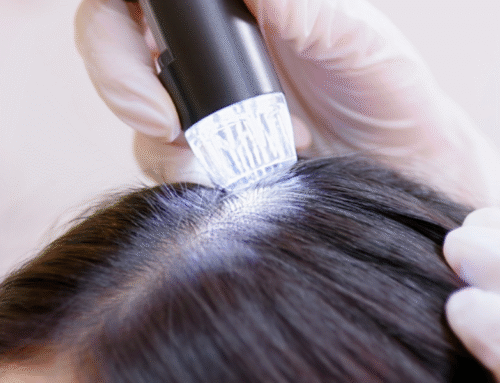Did you know that certain plants can help balance your immune system and improve alopecia areata? If you’ve been looking for natural alternatives to treat this condition, phytotherapy could be an effective option. In this article, we’ll explore how medicinal plants can modulate your immune system and the benefits of personalized phytomedicine treatments to combat alopecia areata.
What is Alopecia Areata and How Does It Affect the Immune System?
Alopecia areata is an autoimmune disease where the immune system mistakenly attacks hair follicles, causing hair loss in specific areas. While it poses no serious health risks, it can have a significant emotional and psychological impact.
Why Does This Autoimmune Attack Occur?
The immune system is designed to protect the body against viruses, bacteria, and other external agents. In people with alopecia areata, this system becomes dysregulated and confuses hair follicles with a threat, attacking them and causing hair loss.
Some factors that can trigger or worsen alopecia areata include:
- Physical or emotional stress
- Genetic factors
- Viral infections
- Hormonal imbalances
What is Phytotherapy and How Can It Help with Alopecia Areata?
Phytotherapy involves the use of plant extracts for therapeutic purposes. In the case of alopecia areata, certain plants have anti-inflammatory, immunomodulatory, and regenerative properties that help restore immune balance and promote hair growth.
Unlike conventional treatments that only address symptoms, phytotherapy targets the underlying causes of immune dysregulation, offering a more natural and personalized approach.
How Does Phytotherapy Modulate the Immune System in Alopecia Areata?
- Regulating the Immune Response
Some medicinal plants can balance the immune system, reducing the overreaction that leads to hair follicle attacks. For example:
- Echinacea purpurea: Strengthens the immune system and regulates its activity to prevent excessive autoimmune responses.
- Curcuma longa (Turmeric): Has anti-inflammatory and antioxidant properties that help reduce inflammation in hair follicles.
- Reducing Inflammation
Inflammation of the scalp is a key factor in alopecia areata. Plants with anti-inflammatory effects help calm the immune system and prevent ongoing damage to the follicles.
- Glycyrrhiza glabra (Licorice): Its anti-inflammatory effects soothe affected areas and promote hair regeneration.
- Aloe vera: Hydrates, soothes, and reduces inflammation on the scalp, creating an optimal environment for hair growth.
- Supporting the Nervous System to Reduce Stress
Stress is a common trigger for alopecia areata. Some adaptogenic plants help balance the nervous system, reducing stress and strengthening immune response.
- Withania somnifera (Ashwagandha): Improves stress response and balances immune functions.
- Melissa officinalis (Lemon Balm): Calms the nervous system and reduces the effects of chronic stress.
Benefits of Personalized Phytomedicine Treatments for Alopecia Areata
Personalized phytomedicine treatments offer a comprehensive approach tailored to each person’s specific needs. Some key benefits include:
🌱 Natural and Non-Invasive Approach
Unlike traditional medications, phytotherapy uses natural compounds with fewer side effects, making it a safe and effective long-term option.
🌱 Precise Immune System Modulation
Personalized treatments can adjust specific plants and dosages to balance the immune response without completely suppressing it.
🌱 Reduced Inflammation and Hair Regeneration
Plants with anti-inflammatory properties help soothe the scalp and promote new hair growth.
🌱 Comprehensive Treatment of Underlying Causes
These treatments not only address visible symptoms but also target triggers such as stress, systemic inflammation, and hormonal imbalance.
How is a Personalized Phytotherapy Treatment for Alopecia Areata Created?
At We Are HairWise, we analyze each case individually to design a treatment tailored to your body’s specific needs. The process includes:
- Personalized Evaluation: We assess your medical history, lifestyle, and triggering factors.
- Selection of Specific Plants: We use plant extracts with immunomodulatory, anti-inflammatory, and regenerative properties.
- Ongoing Treatment Adjustment: We monitor your progress and adjust formulas as your condition evolves.
How Long Does It Take to See Results?
Response to phytotherapy treatments varies for each individual. Generally, the first signs of improvement can be observed within 3 to 6 months of continuous use. Success depends on consistency and following the recommended personalized treatment.
Tips to Enhance the Effects of Phytotherapy in Alopecia Areata
- Maintain a Balanced Diet: Prioritize foods rich in antioxidants, B vitamins, and zinc.
- Reduce Stress: Practice relaxation techniques like meditation or yoga to manage stress levels.
- Avoid Harsh Chemicals: Use natural, toxin-free products to care for your scalp.
Conclusion: Phytotherapy as a Natural Alternative to Modulate the Immune System in Alopecia Areata
Phytotherapy offers a natural and personalized approach to treat alopecia areata from its root cause. By modulating the immune system, reducing inflammation, and supporting hair regeneration, these treatments can be an effective and safe long-term solution.
If you’re looking for a natural alternative that cares for both your hair and overall well-being, a personalized phytomedicine treatment may be the next step toward your recovery.
Take the First Step Toward a Natural and Personalized Solution!
At We Are HairWise, we’re here to help you regain your hair safely and naturally. Contact us and discover how a personalized treatment can make a difference.
📧 hello@wearehairwise.com
📞 3057998276
🌐 wearehairwise.com
📍 245 SE 1st Street, Suite 201, Miami FL 33131
Start your journey today toward a natural and effective solution for alopecia areata!





